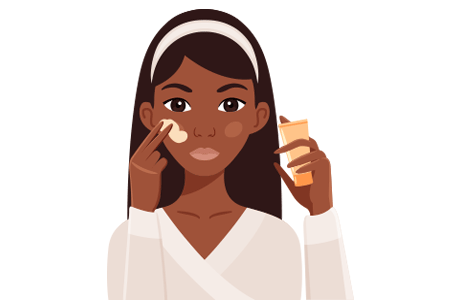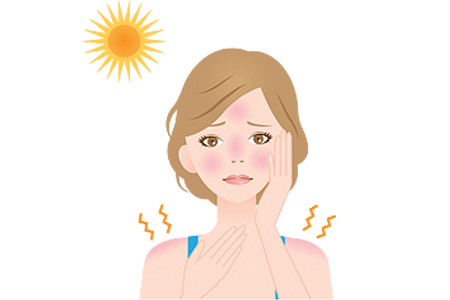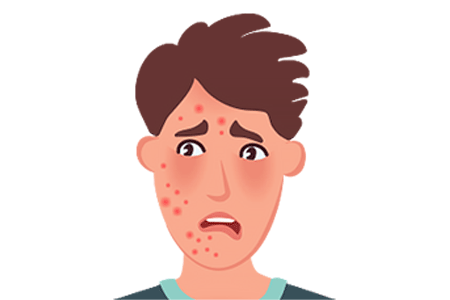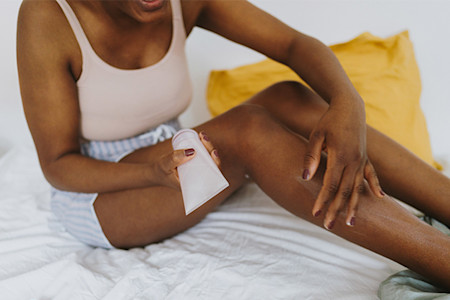Isotretinoin: The truth about safety, side effects, and skin care
What is isotretinoin?
Isotretinoin is a prescription medication that can treat deep, painful acne cysts and nodules. Treatment usually takes about six months but may be longer or shorter. The U.S. Food and Drug Administration (FDA) has approved isotretinoin to treat patients 12 years of age and older.
Dermatologists often refer to this medication as “the most effective treatment for severe acne.” It can diminish or clear severe acne. Fewer breakouts lead to fewer acne scars.
Are isotretinoin and Accutane the same thing?
Yes. Accutane is a brand name of isotretinoin. While the Accutane brand is no longer available in the United States, many people still refer to isotretinoin as Accutane.
The brand names of isotretinoin available in the United States are:
Brand names: Absorica, Amnesteem, Claravis, and Zenatane
Isotretinoin: Patient safety is priority #1
Isotretinoin can treat severe acne when other treatments fail, making it an important medication. As the acne clears, dermatologists often see patients’ quality of life improve.
To ensure the best possible outcomes for their patients, dermatologists are committed to using this medication safely. To do this, dermatologists evaluate each patient before prescribing isotretinoin.
If this medication is an option for you, your dermatologist will talk with you about the risks, benefits, and possible side effects and answer questions you may have. If you decide to take isotretinoin, your dermatologist will enroll you in a safety program called iPLEDGE REMS. This is an FDA-required, risk-management program. To receive isotretinoin, patients must be enrolled in this safety program.
Isotretinoin: How to manage side effects
When it comes to side effects, myths and misconceptions about isotretinoin are common.
Having accurate information can help you:
Ask informed questions.
Feel more confident in your decision about whether to take this medication.
Understand and relieve common side effects.
Here are science-backed facts about possible side effects and tips for managing them. We begin with mild side effects, sharing dermatologists' tips that can help you get relief.
Dryness
Dry skin, chapped lips, dry and irritated eyes, and even nosebleeds are common while taking isotretinoin.
Once you stop taking isotretinoin, the dryness will clear.
To reduce dryness while taking isotretinoin, try these dermatologists’ tips:
Dry skin: To reduce the dryness:
Slather an oil-free moisturizer (helps skin hold on to moisture) or emollient (softens and smooths skin by filling tiny cracks and rough patches) on acne-prone skin like your face, neck, shoulders, and back, applying it when your skin is still damp after cleansing and whenever your skin feels dry.
Use a rich, creamy moisturizer or emollient after bathing and as needed.
Choose products labeled “hypoallergenic” or “non-comedogenic.” Non-comedogenic products may be labeled “oil free” or “won’t clog pores.”)
Applying an oil-free moisturizer can reduce dryness without causing breakouts
Moisturizer works best when you apply it after washing while your skin is damp.

Dry, chapped lips: To reduce dry, chapped lips:
While outdoors: Use lip balm with SPF of 30 or higher.
While indoors: Apply petroleum jelly throughout the day and before bed to your lips to help them stay moisturized.
For more tips, watch How to prevent and treat dry, chapped lips.
Dryness inside nose and nosebleeds: Treating dryness inside your nose as soon as you notice it can prevent (or reduce) nosebleeds. To treat dryness:
Use a moisturizing nasal spray or dab a very small amount of petroleum jelly just inside your nostril. When using petroleum jelly, do not snort or inhale it.
Pro tip: If you use petroleum jelly, choose the type that comes in a squeeze tube to reduce the likelihood of placing germs from the container in your nose.
Dry, irritated eyes: To get relief:
Use saline eye drops or artificial tears.
Caution: Only use medicated eyedrops to relieve dry, irritated eyes if your dermatologist recommends them.
Sun-sensitive skin
While taking isotretinoin, your skin may become more sensitive to the sun, causing you to sunburn more quickly and unexpectedly. This effect will go away once you stop taking isotretinoin.
To avoid unexpected sunburns while taking this medication, dermatologists recommend using sun protection. When you protect your skin from the sun, you can also prevent acne from worsening.
Here’s how to protect your skin from the sun:
Seek shade.
Wear sun-protective clothing, including long sleeves, pants, and a wide-brimmed hat.
Choose the right sunscreen. You want to use a non-comedogenic (won’t clog pores) sunscreen that offers SPF 30 or higher, broad-spectrum protection, and water resistance. Because your skin may be sensitive, it can help to choose mineral sunscreen that contains titanium dioxide, zinc oxide, or both.
Apply sunscreen to all skin not covered by clothing.
Reapply sunscreen at least every 2 hours, and after swimming or sweating.
Wear sunglasses with UV protection. Sunglasses that offer UV protection help protect the delicate skin around your eyes and help dry eyes feel more comfortable.
Protect your skin
Dermatologists recommend that you seek shade, wear sun-protective clothing, and apply sunscreen (oil-free, SPF 30 or higher, broad-spectrum protection, and water resistant) to all skin not covered by clothing.

Acne worsens
While this doesn’t happen to most patients, some see their acne worsen when they start taking isotretinoin. Keep in mind that acne can worsen when a patient starts other acne treatments.
If your acne worsens, tell your dermatologist, so they can help you manage this temporary side effect.
Worsening acne is a temporary side effect
When you start taking isotretinoin, acne may worsen for 1 to 2 months before it begins to clear.

Isotretinoin can affect your eyesight, hair, muscles, or joints
While taking isotretinoin, you may temporarily develop:
Trouble seeing at night
Thinning hair
Muscle (or joint) pain
When you stop taking isotretinoin, these side effects tend to go away.
Serious side effects of isotretinoin
While the above possible side effects are manageable and tend to go away, some side effects are more serious. Dermatologists will tell you about the following possible side effects:
Birth defects and other risks to an unborn child
The possibility of these side effects occurring is well known. If a person takes isotretinoin while pregnant, this medication can cause:
Severe birth defects
Miscarriage or stillbirth (loss of baby before birth)
Premature birth (baby born early)
Pregnancy prevention program in place: To help patients avoid these serious side effects, the FDA requires that all patients taking isotretinoin be enrolled in a program called iPLEDGE REMS. This program requires all patients who can get pregnant to take:
2 pregnancy tests (before they can get a first prescription for isotretinoin)
A pregnancy test every 30 days (to obtain a refill)
Patients who are sexually active and can get pregnant must also agree that they will use 2 forms of birth control or remain abstinent (no sexual intercourse). They must agree to do this:
For one month before taking isotretinoin
While taking isotretinoin
For at least one month after they finish taking the medication
Depression, anxiety, or other mood disorders
You may have heard that isotretinoin can cause mood changes, leading to depression, anxiety, or irritability. You may have come across news of patients developing suicidal thoughts or committing suicide. Dermatologists take reports of these side effects seriously.
To find out what’s really happening, dermatologists and other researchers have conducted numerous studies. Here’s what they’ve learned.
It’s possible that having severe acne increases the risk of developing mood changes. Researchers have found that having severe acne causes some patients to become depressed. This is true for people with severe acne whether they take isotretinoin or not.
Other studies suggest that isotretinoin is associated with a reduced risk of developing mood changes, such as depression and anxiety.
It’s important to understand the meaning of the words “associated with.” In medical research, the word “association” means when one thing changes, such as taking isotretinoin, another often changes. In this instance, another refers to the patient’s mood, which improves. But it doesn’t mean taking isotretinoin causes an improved mood.
Dermatologists agree that further studies are needed to understand who is most at risk of developing mood changes while taking isotretinoin.
To help patients with this possible side effect, dermatologists:
Are trained to spot warning signs of depression and anxiety.
Screen patients carefully for signs of depression and thoughts of suicide before prescribing isotretinoin. This helps them determine if this medication is a good option for each patient.
Isotretinoin may cause mood changes
If you or a loved one notices that your mood changes while on isotretinoin, immediately tell your dermatologist.
Inflammatory bowel disease (IBD)
IBD is a group of diseases that causes long-lasting inflammation in the digestive system, leading to symptoms like abdominal pain, diarrhea, and weight loss. Crohn’s disease and ulcerative colitis are two types of IBD.
More studies are needed to know whether IBD is a possible side effect of taking isotretinoin. Here’s what we know so far:
IBD and severe acne (deep, painful acne cysts and nodules) are both inflammatory conditions, and some people develop both conditions. This includes people who have never taken isotretinoin.
Some patients take an antibiotic to treat acne. Some studies suggest that taking antibiotics, especially certain ones taken for long periods, may increase the risk of developing IBD later.
Given what we know, it’s not possible to tell whether IBD is a possible side effect of taking isotretinoin. To find out, we need carefully designed studies. During these studies, one thing researchers will need to do is look at the large amounts of data from previous studies. This can help them find the relationships between acne, antibiotics, and IBD. This research takes time.
Other possible side effects
When taking isotretinoin, other side effects may occur. These include:
Stomach problems
Unhealthy cholesterol levels
Liver problems
Isotretinoin may cause side effects
If you develop a side effect while taking isotretinoin, contact your dermatologist.
Safety is priority #1, so your dermatologist will check your cholesterol levels and how your liver is working before you start taking isotretinoin and again while you’re taking it. To check these, you’ll need a blood test.
If you need help with other side effects, your dermatologist can also help. For example, your dermatologist can recommend a skin care routine while you're taking isotretinoin.
Is there a skin care plan that I should follow while taking isotretinoin?
Yes. The right skin care can help reduce discomfort from side effects, such as dry skin, cracked lips, and sun sensitivity. When your skin feels better, it’s easier to stick to your treatment plan. Here's the 4-step skin care plan dermatologists recommend while patients take isotretinoin:
Wash acne-prone skin with a gentle cleanser: Gentle and emulsion cleansers (ones you shake up before using, like micellar water) can help keep your skin clean during your acne treatment. To find a gentle product, look for the words “gentle,” “hydrating,” or “sensitive skin” on the label.
Pro tips:- When applying cleanser, use your fingertips.
- Limit cleansing to twice daily and after sweating.
- Avoid abrasive scrubs or cleansers, such as ones with an exfoliant.
Apply moisturizer after cleansing: Isotretinoin can make your skin very dry. While your skin is still damp after cleansing, apply a non-comedogenic (label may say “oil-free”) moisturizer. This helps to relieve dry skin.
Protect your skin from the sun: When outdoors, seek shade, wear sun-protective clothing, and use oil-free (non-comedogenic) sunscreen with SPF 30 or higher, broad-spectrum protection, and water resistance.
Use lip balm or petroleum jelly to relieve dry lips: When outdoors, use lip balm with SPF 30 or higher.
Skin care isn’t just for your face — taking isotretinoin affects the skin on your body, too.
Use gentle cleansers, oil-free moisturizers, and sunscreen on your body along with your face.

What skin care ingredients should I use while taking isotretinoin?
The skin care products you use while taking isotretinoin don’t need to be expensive. You may be able to use products you already own.
Look for products that contain one or more of these ingredients listed on the label, as they can help strengthen your skin while taking isotretinoin:
Humectants like hyaluronic acid and glycerin help hydrate your skin.
Aloe vera is a lightweight ingredient that soothes and moisturizes.
Biosaccharides help your skin feel smooth.
Oligosaccharides help balance your skin barrier.
Ceramides help your skin retain moisture.
Squalane is an emollient, which soothes skin.
Should I avoid any products or skin care ingredients while taking isotretinoin?
Yes. Some ingredients and products can do more harm than good while you’re taking isotretinoin. Here’s what dermatologists recommend you avoid:
Vitamin A supplements: Isotretinoin is derived from vitamin A, so taking a vitamin A supplement can increase the risk of developing side effects.
Retinol (applied to the skin): This ingredient can irritate your skin, which is more sensitive while you’re taking isotretinoin.
Benzoyl peroxide or sulfur: These acne-fighting ingredients can increase skin irritation and dryness.
Vitamin C (in skin care products): Used to brighten skin, this ingredient can be too harsh for your sensitive skin.
Exfoliants: Alpha-hydroxy acids (AHAs) and beta-hydroxy acids (BHAs) like glycolic acid, lactic acid, and salicylic acid; sugar, coffee grounds, and exfoliating beads can weaken and irritate your skin.
Fragrances and dyes: They often irritate sensitive skin. They may cause an allergic skin reaction.
Toners: These can be too harsh on your skin while you’re taking isotretinoin.
Follow-up care while taking isotretinoin
In addition to giving tips to help lessen side effects like dry and sensitive skin, your dermatologist will watch you closely while you take isotretinoin. To do this, you will meet with your dermatologist every 30 days.
As a safety precaution, a doctor can only prescribe isotretinoin for 30 days at a time. To get a refill, you need to check in with your dermatologist. This check-in may be either in person or virtually through telemedicine.
During each check-in, your dermatologist will see how you’re doing and look at the results of required tests. If you can get pregnant, this will include a monthly pregnancy test.
Your check-ins also give you the opportunity to tell your dermatologist how you’re feeling. This is important. Be sure to mention any change in how you feel, even if it seems unrelated to taking isotretinoin. Your dermatologist knows how to help you sort out what’s happening.
If all is well, your dermatologist can write another 30-day prescription for isotretinoin.
Isotretinoin is powerful medication. By partnering with a board-certified dermatologist, you will receive an expert evaluation that will tell you whether isotretinoin is right for you. If it is, your dermatologist will talk with you about any concerns and help you take this medication safely.
Related AAD resources
Images
Getty Images
References
American Academy of Dermatology and AAD Association, “Position statement on isotretinoin.” Last revised May 3, 2025. Last accessed June 3, 2025.
Bettoli V, Guerra-Tapia A, et al. “Challenges and solutions in oral isotretinoin in acne: Reflections on 35 years of experience.” Clin Cosmet Investig Dermatol. 2019;12:943-51.
Dréno B, Araviiskaia E, et al. “Nonprescription acne vulgaris treatments: Their role in our treatment armamentarium—An international panel discussion.” J Cosmet Dermatol. 2020; 19: 2201–11.
iPLEDGE. “iPLEDGE REMS guide for patients who can get pregnant.” Last updated October 2021. Last accessed June 3, 2025.
Li C, Chen J, et al. “Use of isotretinoin and risk of depression in patients with acne: A systematic review and meta-analysis.” BMJ Open. 2019 Jan 21;9(1):e021549.
Pile HD, Patel P, et al. “Isotretinoin.” [Updated 2025 Mar 4]. In: StatPearls [Internet]. Treasure Island (FL): StatPearls Publishing.
Tan NKW, Tang A, et al. “Risk of suicide and psychiatric disorders among isotretinoin users: A meta-analysis. JAMA Dermatol. 2024 Jan 1;160(1):54-62.
Written by:
Paula Ludmann, MS
Brooke Schleehauf
Reviewed by:
Laurel Geraghty, MD, FAAD
Sanna Ronkainen, MD, FAAD
Last updated: 9/22/25
 Atopic dermatitis: More FDA-approved treatments
Atopic dermatitis: More FDA-approved treatments
 Biosimilars: 14 FAQs
Biosimilars: 14 FAQs
 How to trim your nails
How to trim your nails
 Relieve uncontrollably itchy skin
Relieve uncontrollably itchy skin
 Fade dark spots
Fade dark spots
 Untreatable razor bumps or acne?
Untreatable razor bumps or acne?
 Tattoo removal
Tattoo removal
 Scar treatment
Scar treatment
 Free materials to help raise skin cancer awareness
Free materials to help raise skin cancer awareness
 Dermatologist-approved lesson plans, activities you can use
Dermatologist-approved lesson plans, activities you can use
 Find a Dermatologist
Find a Dermatologist
 What is a dermatologist?
What is a dermatologist?